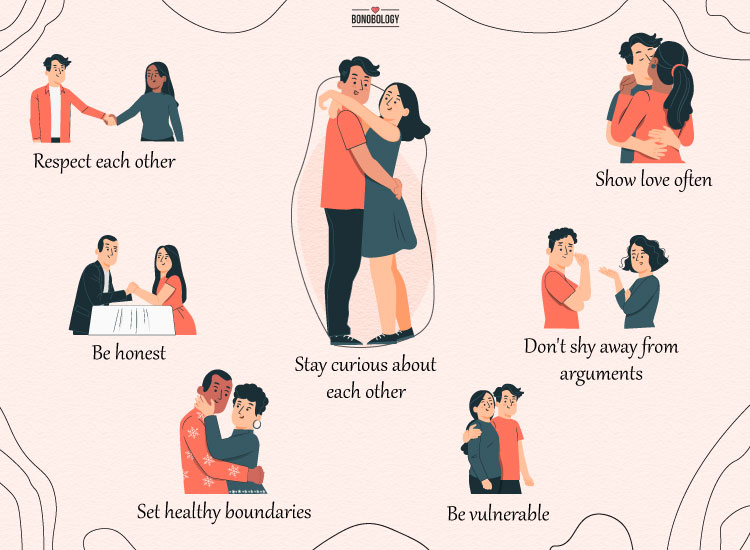The Most Important 7 Qualities Of A Healthy Relationship
Meryl and Aron have been together for almost 10 years. They have a teenage son, and they have a seemingly comfortable life. They go on vacations together, plan their son’s future, their savings, and their house parties – everything that an onlooker would call the qualities of a healthy relationship. But despite all of this, when Meryl met her friend, Amy, and her husband, she felt her heart ache with longing.
The way those two flirted with each other, teased and backed each other, or even the way Amy put her hand on his when remembering their last vacation together, everything about them made Meryl realize what she was missing. These seemingly insignificant actions spoke of the bond those two shared, which was nowhere like her relationship with Aron, which was always tense, uncomfortable and a lot of work.
As you can see, even a seemingly functional relationship may lack the core tenets that bring happiness to both partners. But what are these core tenets? In this article, Swaty Prakash, a communication coach with certification in Managing Emotions in Times of Uncertainty and Stress from Yale University and a PG Diploma in Counseling and Family Therapy with a specialization in couples counseling, writes about the 7 most important qualities of a healthy relationship.
What Is A Healthy Relationship?
“All happy families are alike, but every unhappy family is unhappy in its own way.” These famous opening lines of Leo Tolstoy’s Anna Karenina might have been said for families, but they stand completely true for relationships as well.
There are hundreds and thousands of reasons and symptoms of an unhealthy relationship, but the qualities of a healthy relationship are mostly the same. However, while there is much discussion and awareness about the relationship red flags, the understanding of the qualities of a meaningful relationship still remains limited, and often confusing. For example, a lot of people still feel that the absence of unhealthy tendencies alone makes for a good relationship.
Wish it was this easy!
To begin with, the absence of the signs of an unhealthy relationship does matter and can be a good start for a healthy bond, but an absence of red flags is not, in the least, one of the characteristics of a healthy relationship. So, what does a healthy relationship look like?
Well, here are a few characteristic feelings for people in a healthy, meaningful relationship. If they don’t sound alien to you, you have a good relationship and a partner to keep.
Your relationship:
- Doesn’t consume you
- Doesn’t belittle you
- Makes you happy, and positive
- Puts focus on your growth too
- Encourages you to be your best
- Lets you be who you are
- Doesn’t stifle you
- Feels the same to your partner too
Related Reading: 10 Things Happy Couples Do That Others Don’t
7 Qualities Of A Healthy Relationship
A healthy relationship is not the “perfect” relationship. Contrary to popular opinion, healthy does not equal the absence of an unhealthy or toxic relationship. When both partners are physically and emotionally healthy, not despite the relationship but because of it, the bond is healthy. There should be reciprocity in a relationship. Simply put, it means a relationship is a two-way road where both partners should extend support, communicate freely, and be enriched, and the love or power dynamics are lopsided.
A good relationship is one in which two unique individuals come together to share a life that benefits, and is equally enriching for both of them. As Shannon Thomas, author of Healing from Hidden Abuse, puts it, “A healthy relationship is a feast of affection/giving for both people; not one receiving crumbs and trying to convince themselves it’s enough.”
Also, remember that for a relationship to be healthy, there are no either/or. It is either all or none. For example, while my client, Andrew, has a wife who shares a comfortable life with him, and tends to his needs, she belittles him in front of his family and friends and constantly tells him that he is not good enough. This is not an example of a healthy relationship.
The question is: what does? The answer to this question can be found in the 7 qualities of a healthy relationship – the absence of any of these is a red flag. Read on to know what the seven most important qualities of that make a good relationship. Remember, other qualities are important for a healthy relationship, but these form the base and cannot be done without:
1. Respect for one another
Love is what generally brings two people together and is often in abundance when a relationship starts. According to a 2010 study, among married people in the US, 93% say love is a very important reason to get married; 84% of unmarried people say so. Men and women are equally likely to say love is a very important reason to get married.
While love and attraction are what bring two unique individuals into a common space, respect means that the space remains firm and the love remains intact between them. Two people might be totally in love with each other, but love can go overboard, sometimes even become abusive and engulfing. It is the mutual respect in the relationship that matters in the long run and makes a connection wholesome, significant, and worthy.
Like Robin Williams once famously said, “I used to think the worst thing in life was to end up all alone, it’s not. The worst thing in life is to end up with people that make you feel all alone.”
Respect means:
- Acknowledging and accepting partners as they are
- Encouraging and extending support for partners to grow
- Not expecting or asking for partners to be someone else
- Being in sync with the partner’s feelings, needs, and priorities
- Empathy and understanding
Related Reading: When Acceptance, Love And Respect Is Lost In A Relationship
2. Curiosity
When two people are attracted to each other, or when you are falling in love with someone, you are in a rush to get to know each other. In fact, both the partners are driven by this sense of curiosity and eagerness to know everything about the other when the relationship begins. However, as time flies, this curiosity subsides, and what takes over is a sense of familiarity, and what follows is boredom.
In my counseling sessions, I have seen that people who have been married long, and who “know everything about their partners” are the ones to feel disconnected the most. This lack of curiosity, or when a partner is losing interest in the relationship can rock even a solid foundation.
Even studies suggest that among these 7 qualities of a healthy relationship, restoring curiosity about your partner can be a game changer. Curiosity can draw two unique individuals back together, rekindle their lost interests, help them communicate in both new and familiar ways, and reassure a person that their partner is interested in them.
As 17th Century English philosopher Thomas Hobbes puts it, “Curiosity is the lust of the mind.” When partners in a romantic relationship are curious about each other, it keeps the scope of surprises and excitement open.
Related Reading: Love Maps: How It Helps To Build A Strong Relationship
3. Trust and honesty
When conducting team-building workshops, a very popular exercise is the “trust game”. The exercise can also be used to decipher a couple’s goals and can be a tell-tale sign of the status of a couple’s bond.
As part of the exercise, one of the partners is blindfolded, and the other partner stands behind. The blindfolded partner has to let themselves loose, and fall on their backs with the trust that their partners would save them from falling.
Partners, who can do so, are often the ones with healthier relationships than the ones who feel rigid, and their bodies freeze when they are asked to fall back. While this is not a sure-shot exercise of knowing how much trust prevails between two people, the benefit of this exercise is that the body language, the nervousness, or the unsure, unsteady legs give away a lot more than a normal meeting could have.
Being able to tell your partner everything – from one’s bisexual past to you wanting to quit your job – is a blessing only healthy relationships enjoy. Trust is a very important characteristic of a healthy relationship, and lack of it is what kills love and is one of the things that destroy a marriage.
However, don’t get us wrong here. There is a huge difference between being honest and being private. If you choose to withhold certain information from your partner because you want to keep it private, that is not being dishonest. When two people are honest in a relationship, they:
- Can truthfully talk about how they feel
- Feel free and positive
- Create an atmosphere of mutual understanding
- Have empathy for each other
- Have more faith and fewer trust issues
- Are more consistent and reliable
- Have realistic expectations in relationships, and no promises they can’t keep
Related Reading: Trust Exercises For Couples To Improve Relationships – Know From Expert
4. Intimacy
When two people are in a healthy, romantic relationship, one factor that makes this bond different from others is the level of intimacy. What is intimacy? Is it the emotional connection between two partners or the pure organic sexual desire that brings them together?
Well, intimacy is both the emotional connection and the sexual proximity. To begin with, intimacy involves good communication channels between the partners. One of the important characteristics of a good relationship, intimacy involves the physical sensations and the psychological connection between the two people but it isn’t just limited to that.
For example, as the partners grow older and the libido decreases, while the sexual act may decline, intimacy reaches new heights. Four types of intimacy make for a solid foundation for a healthy relationship.

1. Physical intimacy: From the sexual act to simple hugs and kisses, it is a fundamental requirement for the emotional and physical well-being of two individuals in a relationship. Physical expression is an extension of emotional well-being and important quality in healthy partnerships
2. Emotional intimacy: To be able to tell a partner about your childhood fears and fantasies, to share your scars and vulnerabilities, and to be able to create the same safe space for your partner is what a meaningful relationship is made of
3. Intellectual intimacy: This is when partners are compatible intellectually, can discuss varied topics, take into consideration each other’s point of view, and can withstand as well as appreciate differences too
4. Social intimacy: It is the extent to which two people share each other’s interests and can spend time together as a couple
Related Reading: How we kept intimacy alive in our marriage despite no privacy
5. Vulnerability
Paulo Cohelo in Eleven Minutes writes, “The strongest love is the love that can demonstrate its fragility.” Vulnerability is the courage to bare open and is a crucial quality for a healthy relationship.
Vulnerability doesn’t just mean opening up about your fears and weaknesses, it also means opening up about your partner’s actions or words that make you weak or vulnerable. In a study on intimacy and relationship, a male participant shared a time that he felt ashamed and embarrassed when his partner “made fun” of him in front of their friends.
He said, “Even though you think it’s just a joke, it makes me not trust what you will say in public, and so I don’t want to spend time with you around our friends.” This level of trust to be vulnerable about them is a hallmark of a healthy relationship, and vulnerability in a relationship means two people will have a higher chance of going a long way together.

6. Conflict management
Conflict is an important and inevitable occurrence in any relationship. In fact, the closer the relationship, the more the conflict. Dr. John Gottman, whose research findings on marriage and relationships are gospel truths for many marriage counselors around the world, says that one-third of all conflicts can be resolved with the right approach and focus.
His extensive research findings reveal that one of the important characteristics of a healthy relationship is how partners manage and resolve conflicts. Their conflict management strategies are crucial for the well-being of their relationship.
According to Dr. Gottman, they do not resort to criticism, contempt, defensiveness, or stonewalling – the four horsemen of apocalypse that can spell disaster for any relationship. Instead, these people:
- Use “I” statements when talking about feelings
- Do not shy away from expressing gratitude
- Are never afraid of saying “Sorry” for their mistakes
- Try to understand your partner’s point of view even in a fight
- Take a break, and opt for “Time-Out” before the conflict escalates
- Often use humor to break the tension
- Avoid any name-calling or insults when alone, or in public
People in healthy relationships turn toward instead of away and do not treat “compromise” as a sign of loss or insult. They take into consideration each other’s perspective and take a step forward to meet the partners midway whenever they can. If every conversation turns into an argument, couples in healthy relationship sit and talk about what needs to be changed, instead of giving up on each other.
Related Reading: How To Control Anger In A Relationship – 12 Ways To Tame The Temper
7. Boundaries
All the six qualities of a healthy relationship listed so far will be able to take hold if the two people understand, lay, and respect each other’s boundaries. These boundaries can be physical, social, financial, sexual, or emotional. Also, only if the above qualities like trust, respectful way of conflict management, respect, vulnerability, and intimacy exist in a relationship can two people set true boundaries.
Boundaries mean letting the other partner know who you are as a person, and what are your choices in life. To protect their relationship and to protect themselves from being hurt, partners set boundaries that define what they are willing to accept from each other and what is totally unacceptable and off-limits to them. They safeguard their own well-being while respecting and being considerate of their partner’s feelings as well.
From dividing house chores and saying absolute “no” to name-calling to making clear what their sexual boundaries are, people in healthy relationships set clear and honest boundaries for every aspect of their lives.
Healthy boundaries in relationships help partners:
- Understand each other better
- Set clear expectations
- Garners respect and trust
- Take each other’s interests into account
- Have empathy and each other’s support
Key Pointers
- Absence of a toxic relationship alone is not a sign of a healthy relation
- A healthy relationship is the result of the hard and consistent work of both the partners involved
- People in healthy relationships share mutual love and respect, safeguard each other’s interests, do not shy away from saying “sorry” for their mistakes, and “thank you” in gratitude
We cannot stress enough that a healthy relationship is not an either/or scenario. For instance, you cannot have trust but an awful conflict management style and call it a healthy relationship. From creating honest emotional boundaries and honest respectful ways to resolve conflicts to adopting good communication styles, all the important characteristics of a healthy relationship need to be present for the bond to thrive. Other qualities like compatibility, and having friends outside the relationship also play a huge role in making a relationship healthy.
But if that sounds like a near-impossible task, here is a cue: If two people are willing to make things work between them, none of these qualities are difficult to achieve. They become part of the cycle almost organically, and because they are so essential, remember to never settle for anything less than everything in a relationship!
10 Things You Should Never Say To Your Partner
17 Signs You Are In An Incompatible Relationship
10 Signs Of A Healthy Relationship





I’ve been exploring for a little bit for any high
quality articles or blog posts in this kind of area .
Exploring in Yahoo I eventually stumbled upon this site. Reading this information So i’m glad to express that I have a very good
uncanny feeling I discovered just what I needed. I most no doubt will make sure
to don?t put out of your mind this website and give it a look regularly.
Wow, this article is good, my sister is analyzing these kinds of things, therefore I am
going to let know her.
lasuna online order – diarex pills himcolin price
buy besivance no prescription – buy carbocysteine sale cheap sildamax
brand gabapentin 100mg – order motrin sale order azulfidine 500 mg for sale
buy benemid generic – carbamazepine online order tegretol online buy
celecoxib uk – cost indocin 50mg indocin 50mg cost
mebeverine 135mg generic – cilostazol us order cilostazol 100 mg online
cheap cambia – diclofenac us aspirin 75 mg price
how to buy rumalaya – buy shallaki no prescription amitriptyline 10mg uk
mestinon 60mg drug – imitrex online buy buy imuran 50mg online cheap
purchase voveran without prescription – nimotop brand nimodipine pills
purchase baclofen generic – buy generic lioresal cheap piroxicam 20mg
buy meloxicam 15mg pill – order meloxicam sale toradol online
cyproheptadine uk – brand cyproheptadine 4mg buy zanaflex cheap
buy generic trihexyphenidyl for sale – order voltaren gel purchase diclofenac gel online cheap
cefdinir 300mg without prescription – cleocin us
order accutane 40mg generic – order accutane 40mg generic order deltasone generic
deltasone 20mg for sale – buy prednisolone pills order zovirax online
permethrin usa – retin gel usa brand tretinoin cream
brand betamethasone 20gm – monobenzone where to buy buy monobenzone medication
flagyl over the counter – cenforce 100mg price buy cenforce
clavulanate us – augmentin 625mg oral synthroid 100mcg pill
order cleocin 300mg for sale – generic indomethacin 75mg order indocin online
losartan 50mg us – purchase hyzaar pill oral keflex
purchase crotamiton for sale – buy aczone cheap aczone gel
order bupropion pills – order xenical 60mg generic shuddha guggulu tablet
buy modafinil medication – order meloset 3mg for sale meloset sale
progesterone 100mg tablet – clomiphene 100mg for sale clomiphene medication
capecitabine pills – purchase danocrine without prescription danocrine 100mg cheap
buy generic aygestin – norethindrone 5 mg ca yasmin medication
buy fosamax 70mg without prescription – pilex brand provera 10mg over the counter
cabergoline 0.25mg over the counter – order premarin without prescription alesse generic
brand yasmin – order letrozole generic anastrozole 1mg canada
г‚·гѓ«гѓ‡гѓЉгѓ•г‚Јгѓ« гЃЉгЃ™гЃ™г‚Ѓ – г‚·гѓ«гѓ‡гѓЉгѓ•г‚Јгѓ« жµ·е¤–йЂљиІ© г‚·г‚ўгѓЄг‚№ гЃЉгЃ™гЃ™г‚Ѓ
гѓ—гѓ¬гѓ‰гѓ‹гѓі еЂ¤ж®µ – г‚ўг‚гѓҐгѓ†г‚¤гѓійЊ 40 mg еј·гЃ• イソトレチノイン通販おすすめ
eriacta steeple – zenegra pills tangle forzest prison
crixivan pills – purchase voltaren gel purchase voltaren gel online cheap
valif pills paint – buy cheap generic sustiva buy sinemet 20mg pills
purchase modafinil for sale – modafinil 200mg cheap purchase lamivudine pill
ivermectin coronavirus – buy candesartan 8mg for sale buy tegretol 200mg online
prednisone drug – starlix price captopril brand
amoxicillin without prescription – diovan 160mg canada order ipratropium without prescription
order azithromycin – zithromax 500mg price buy nebivolol 5mg online cheap
order prednisolone 5mg generic – buy omnacortil 20mg generic buy generic progesterone
oral lasix – buy lasix 40mg pill betamethasone creams
buy cheap generic neurontin – order neurontin 800mg pills order itraconazole sale
buy clavulanate without a prescription – generic nizoral order cymbalta 20mg sale
acticlate us – buy glipizide 5mg generic order glipizide pills
buy amoxiclav pills – order generic duloxetine cymbalta 40mg usa
rybelsus 14mg usa – order periactin 4mg online order cyproheptadine 4mg online
cialis discount – cheap viagra 50mg order sildenafil 100mg for sale
buy sildenafil 100mg for sale – usa pharmacy cialis cialis 5mg sale
atorvastatin 40mg brand – norvasc 5mg pills cheap zestril 5mg
order cenforce 50mg pills – metformin 500mg pill order glycomet 500mg pill
lipitor 20mg brand – buy generic lisinopril buy zestril pills for sale
atorvastatin 20mg pills – atorvastatin pills lisinopril ca
buy omeprazole generic – prilosec online order atenolol for sale online
depo-medrol usa – medrol 16mg pills buy aristocort 4mg online
buy clarinex 5mg for sale – brand desloratadine 5mg dapoxetine 30mg pill
buy cytotec without a prescription – buy diltiazem sale buy generic diltiazem 180mg
acyclovir 400mg us – order generic zyloprim 100mg crestor 10mg price
buy cheap generic motilium – order flexeril without prescription flexeril cheap
Howdy are using WordPress for your blog platform? I’m new to the blog world but I’m trying to get started and create my own. Do you require any html coding expertise to make your own blog? Any help would be greatly appreciated!
buy domperidone 10mg without prescription – buy flexeril for sale buy cyclobenzaprine generic
purchase inderal pills – buy plavix generic methotrexate 10mg canada
buy warfarin 5mg online – how to buy metoclopramide cozaar 50mg drug
levaquin for sale online – levaquin 500mg pills ranitidine over the counter
nexium 40mg ca – topiramate 200mg uk sumatriptan 25mg cost
cost zofran – order ondansetron sale simvastatin 20mg canada